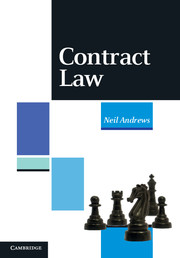Book contents
- Frontmatter
- Contents
- Preface
- Table of cases
- Table of statutes
- Table of statutory instruments
- Part I Introduction
- Part II Formation
- 2 The pre-contractual phase
- 3 Offer and acceptance
- 4 Certainty
- Part III Consideration and intent to create legal relations
- Part IV Third parties and assignment
- Part V Vitiating elements
- Part VI Terms and interpretation
- Part VII Breakdown and liability
- Part VIII Remedies for breach
- Part IX Illegality and public policy
- Part X The future
- Appendix: A who's who of contract law
- Bibliography
- Index
2 - The pre-contractual phase
from Part II - Formation
- Frontmatter
- Contents
- Preface
- Table of cases
- Table of statutes
- Table of statutory instruments
- Part I Introduction
- Part II Formation
- 2 The pre-contractual phase
- 3 Offer and acceptance
- 4 Certainty
- Part III Consideration and intent to create legal relations
- Part IV Third parties and assignment
- Part V Vitiating elements
- Part VI Terms and interpretation
- Part VII Breakdown and liability
- Part VIII Remedies for breach
- Part IX Illegality and public policy
- Part X The future
- Appendix: A who's who of contract law
- Bibliography
- Index
Summary
INTRODUCTION
Summary of main points
(1) The principle of freedom of contract (1.08) permits negotiating parties to ‘walk away’ from a proposed deal, provided they have not already committed themselves in law to a binding agreement.
(2) In the absence of a binding contract, a person's requested performance, whether delivery of goods or performance of services, can give rise to a restitutionary obligation to pay the reasonable market value of the relevant performance (generally on this type of restitutionary claim: 2.04, 18.55).
(3) In the situation just mentioned, the law is presently defective in not allowing the recipient of the relevant performance to require a reduction in the financial award to reflect slow performance (2.04).
(4) Further points are summarised at 2.06.
A. Berg, ‘Promises to Negotiate in Good Faith’ (2003) 110 LQR 357–63
S. Ball, ‘Work Carried Out in Pursuance of Letters of Intent – Contract or Restitution?’ (1983) 99 LQR 572, especially 576–9, 581–2
P. Giliker, ‘A Role for Tort in Pre-Contractual Negotiations? An Examination of English, French and Canadian Law’ (2003) 52 ICLQ 969, especially 989 to end
English law has fashioned an intricate set of rules governing the pre-contractual context. Readers hoping to find a single formula, such as a pre-contractual duty to negotiate in good faith, will find English law lacking in such simplicity. Our courts have used a ‘Swiss army knife’ for this purpose, rather than a single blade.
- Type
- Chapter
- Information
- Contract Law , pp. 18 - 35Publisher: Cambridge University PressPrint publication year: 2011



